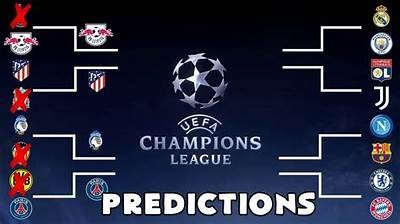Europa League Predictions for Upcoming Matches and Potential Outcomes Analysis
The UEFA Europa League has always been a competition filled with excitement, surprises, and unpredictable outcomes. As clubs from across Europe vie for the coveted title, predicting match outcomes can be both intriguing and complex. In this article, we will analyze various factors that influence match results, consider team strengths and weaknesses, examine player form, and provide predictions for upcoming matches in the tournament.

The current form of a team is one of the most critical aspects when predicting the outcome of a match. Teams that come into the Europa League with strong performances in their domestic leagues are more likely to carry that momentum into the tournament. For example, a team that has been consistently winning their league matches will have higher confidence and morale compared to a lower-tier team struggling to secure points in their local competitions. Historical performance also plays a significant role; teams with a history of strong performances in European tournaments often have the experience and know-how to navigate the pressures of knockout stages.

In addition to team form, individual player performance can dramatically alter the trajectory of a match. Key players, such as strikers or playmakers, can be the difference between victory and defeat. Injuries or suspensions to these crucial players can severely impact a team's chances. Furthermore, the depth of a squad can affect how well a team performs in a congested schedule. Teams that have strong bench players tend to fare better in tournaments, as they can rotate their squads to maintain freshness.

The tactical approach employed by a team’s manager is also significant in predicting outcomes. Different managers have varied philosophies regarding attacking and defensive play. For instance, some may favor a possession-based approach, while others might employ a counter-attacking strategy. Analyzing how a team matches up against their opponent tactically can give insightful clues. Another vital aspect is how well a manager has adapted their strategies to exploit opponents' weaknesses. A manager with experience in European competitions can make crucial adjustments that can tilt the match in their favor.

Home advantage is a well-documented phenomenon in football. Teams playing on their home turf often perform better due to familiar surroundings and support from local fans. However, the nature of the Europa League can sometimes negate this advantage, especially in knockout rounds where the away goals rule may come into play. An examination of how teams have performed in away matches can provide a more nuanced understanding of potential outcomes. Strong teams that are adept at playing on the road may be more equipped to handle the pressures of away matches in Europe.

As the group stages of the Europa League wind down, we focus on specific upcoming matches and provide predictions based on the analysis from previous sections. Key matchups between historically strong teams and underdogs can often yield unexpected results. For instance, when a top team faces a lower league team, one might expect a straightforward victory for the higher-ranked side. However, upsets abound in this tournament, making it essential to consider all factors before making predictions. Not only current form, but also historical rivalries and matchday conditions can come into play during European encounters. Game Strategy and Key Matchups
In addition to broad analyses, breaking down individual matchups can provide an understanding of potential outcomes. Specific players may have history against their opponents that could impact performance. For example, a forward who has consistently scored against a particular goalkeeper may find the confidence to net again. Furthermore, set pieces can often be a decisive factor and teams that have strong attacking options from free kicks or corners may find success against weaker defenses. The Role of Fan Engagement
Fan involvement can’t be overlooked. The emotional support from fans can enhance player performance, especially during crucial moments in a match. Teams that foster a vibrant atmosphere in their stadiums may experience a productivity boost, giving them an edge in tightly contested matches. This level of engagement can particularly impact clubs in financial disparities, as the emotional investment can help drive performances beyond their technical capabilities. Predictions Summary and Future Outlook
As we forecast the upcoming matches of the Europa League, several factors must be taken into account: team form, player conditions, tactical setups, and historical performances. Each match offers a unique set of variables that could influence the final outcome. While predictions can be made based on statistical data and analysis, the nature of football ensures that surprises are always around the corner. We look forward to tracking these matches as they unfold, while continuously reassessing the teams that have the potential to triumph in this prestigious tournament. Conclusion
The UEFA Europa League promises thrilling encounters, and the excitement surrounding upcoming matches is palpable. While predictions can provide a glimpse into potential outcomes, the reality of football lies in its unpredictability. Fans can expect a fierce competition as teams look to make their mark in European football, with results that could defy all expectations.
Unless otherwise specified, the copyright of this article belongs to WillBet: Your Gateway to Premier Online Betting All, please indicate the source for reprinting.
Category: fist of destruction
Title: Europa League Predictions for Upcoming Matches and Potential Outcomes Analysis
Related
Related Sites
- 最近发表
-
- Discover Exciting Backseat Gaming Slots Online for Ultimate Fun and Big Wins
- Lothar Matthäus Career Achievements and Partnership with Interwetten Explained in Detail
- Latest Updates and Promotions Available Today on Www Interwetten Com Online Sportsbook Platform
- Discover the Ultimate Betting Experience with Www Willbet 288 Online Platform for Reliable Sports Wagering
- Top Online Casinos for Real Money in 2024 Best Trusted Gambling Sites Reviewed
- Discover the Ultimate Willbet Slot Experience with Exciting Features and Big Winning Chances
- Discover the Ultimate Casino Experience with 1xbet Online Platform for Secure and Exciting Gambling
- Comprehensive Review of 22Bet Casino Featuring Games Bonuses and Secure Payment Options
- Discover How to Maximize Your Winnings with Fanatics Casino Free Play Offers and Bonuses Online
- A Comprehensive Overview of the Interwetten Logo Design Elements and Brand Identity
- 标签列表
-
- online-casino (26)
- live-dealer-games (13)
- sports-betting (65)
- online-gambling (25)
- promotions (20)
- gaming (13)
- online-gaming (32)
- casino-games (42)
- online-slots (16)
- responsible-gaming (16)
- bankroll-management (15)
- responsible-gambling (32)
- Interwetten (67)
- online-betting (62)
- customer-support (16)
- Willbet (15)
- Online-Gambling (21)
- Sports-Betting (26)
- Online-Gaming (24)
- live-betting (19)
- Casino-Games (24)
- mobile-gaming (28)
- betting-strategies (15)
- Online-Betting (24)
- casino-bonuses (17)